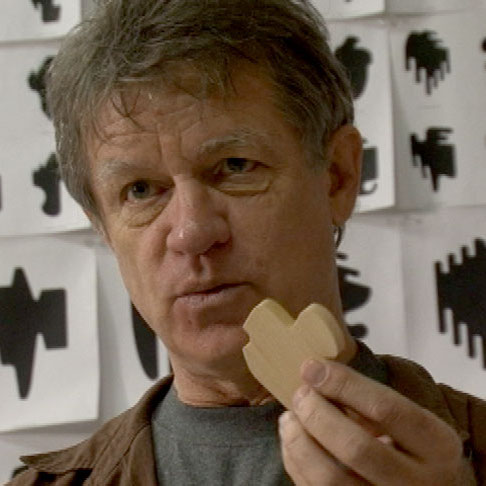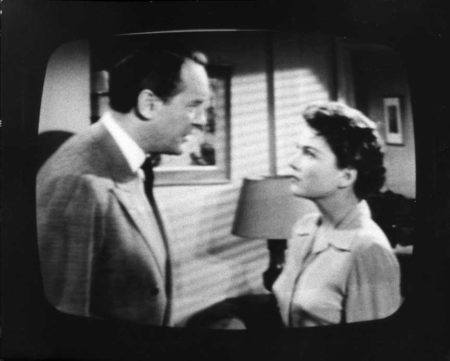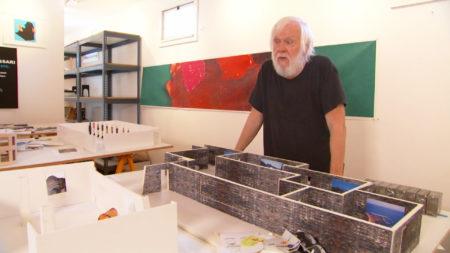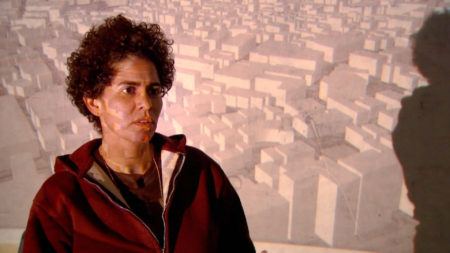Continue playing
(Time remaining: )
Play from beginning
Continue playing "{{ controller.videos[controller.getVideo(controller.currentVideo)].segmentParentTitle}}"
{{controller.videos[controller.getVideo(controller.currentVideo)].title}} has ended.
Allan McCollum in "Systems"
Allan McCollum’s segment begins with his uncle Jon Gnagy’s 1950s television program Learn to Draw. Crediting his uncle’s demonstrations as an early influence, McCollum says “whenever I design a project it’s in my head…that I would be able to show someone else how to do it.”
Describing his aesthetic motivation with the paradox of “wanting to try to work in quantities…and make things that are singular and unique at the same time,” the viewer travels with the artist and his team of studio assistants to the 28th São Paolo Bienal for an installation of 1,800 hand-stenciled, graphite pencil works. McCollum describes devising “a system that would produce a shape for everybody on the planet.”
To make The Shapes Project, the artist developed a set of unique forms that, when fully combined, results in 60 billion individual shapes. McCollum later collaborates with four remote home businesses in Maine, whom he only talked to via email and phone, to produce collections of silhouettes, rubber stamps, wood ornaments, and copper cookie cutters.
Credits
Created by: Susan Sollins & Susan Dowling. Executive Producer & Curator: Susan Sollins. Series Producer: Eve-Laure Moros Ortega. Associate Producer: Migs Wright. Associate Curator: Wesley Miller. Production Manager: Nick Ravich. Production Coordinator: Larissa Nikola-Lisa. Consulting Director: Charles Atlas. Editor: Lizzie Donahue. Director of Photography: Robert Elfstrom, Ian Serfontein, Joel Shapiro, Martial Barrault, Richard Kane, & Richard Numeroff. Additional Photography: Sam Henriques & Bryan Hithe. Sound: Tom Bergin, Ray Day, Roger Phenix, Paul Stadden, & Merce Williams. Assistant Camera: Clair Popkin, Michael Pruitt-Bruun, Jean-Pierre Vial, Kenny Weinberg, & James Weinheimer. Field Producer: Mariana Valdrighi Amaral. On Screen Interviews: Sarah Rentz, Harmony Murphy, Erika Fortner, Damien Young, Jessica Rankin, Brienne Arrington, Analia Saban, Larry Little, & Horace Varnum.
Creative Consultant: Ed Sherin. Art Direction & Design: Open, New York. Graphics Animation: Maurice Caicedo & Urosh Perishic. On-Line Editor: Don Wyllie. Composer: Peter Foley. Voice-Over Artist: Jace Alexander. Sound Editing: Margaret Crimmins & Greg Smith. Sound Mix: Cory Melious. Artwork Animation: Frank Ferrigno. Assistant Editor: Ahmed Amer, Janine Cappadona, Paulo Padilha, Joaquin Perez, Leana Siochi, & Ken Yapelli.
Artworks Courtesy of: John Baldessari; Kimsooja; Allan McCollum; Julie Mehretu; Electronic Arts Intermix; Friedrich Petzel Gallery, New York; Kunstmuseen Krefeld, Museum Haus Lange, Germany; Marian Goodman Gallery, New York; & The Project, New York. Archival Footage Courtesy of: Centre for Fine Arts, Brussels; Agustina Covian; Kimsooja Studio, New York; Thaddeus Seymour & Polly Seymour Gnagy.
Special Thanks: 601Artspace, New York; Akademie der Künste, Berlin; Gert-Jan Akerboom; Vera Alemani; The Art21 Board of Trustees; ARTASIA; Artful Heirlooms; Michael Ashburn; Aunt Holly’s Copper Cookie Cutters; Catherine Belloy; Bienal de São Paulo; Pat Casteel and Steve Wylie; Colby Bird; Kajette Bloomfield; Paul Brewer; Travis Call; Karla Braun; Jacob Cohen; Ralph Cuccurullo; Phil Curtis; Janna de Haen; Dog Bark Sound; Melissa Dubbin; Eike Dürrfeld; Frame:Runner, NYC; Rashell George; Claudia Gerhaeusser; Cormac Graham; Dr. Martin Hentschel; David Howe; Carl Johns; Anna Elise Johnson; Annice Kessler; Eric Kuhl; Holly Little; Los Angeles County Museum of Art (LACMA); Sheila Lynch; Roland Moreau; Museo Nacional Centro de Arte Reina Sofía, Madrid; Muriel Nestler; Ana Otero; Celina Paiz; Marcie Paper; Laura Piasta; Tracy Powell; Prospect.1 New Orleans; Anthony Reach; Inken Reinert; Repeat Impressions; Allie Rex; Andre Ribuoli; Adele Röder; Penelope Santana; Anette Schmitt; Larry Schmitt; Susan Schneider; Karen Schoellkopf; Kim Schoenstadt; Claire Schulte-Heuthaus; Keith Shapiro; Sound Lounge; Felipe Taboada; Charlotte Uslar; Noella Varnum; Amanda Vietta; Jacopo Crivelli Visconti; Tony Volante; Mechthild Von Laue; & Viola A. Yesiltaç.
Additional Art21 Staff: Beth Allen, Mary Cook, Joe Fusaro, Jessica Hamlin, Jennifer H. Lee, Marc Mayer, Jonathan Munar, Katherine Payne, Kelly Shindler, & Sara Simonson.
Interns: Maggie Bordonaro, Krystle DeMauro, Natalia P. Good, Sophie Grant, Pinchang Huang, Joy Lai, Rachele Lam, Jamie Leonardi, Melanie K. Mambo, Pauli Ochi, Sara Odam, David Roesing, Nicole Ross, Nicole Sansone, & Julia Wright.
Public Relations: Goodman Media International. Station Relations: De Shields Associates, Inc. Legal Counsel: Albert Gottesman. Bookkeeper: Valerie Riley. Travel Agent: Lita Gottesman.
Major underwriting for Season 5 of Art in the Twenty-First Century is provided by National Endowment for the Arts, PBS, Agnes Gund, Bloomberg, The Nathan Cummings Foundation, The Andy Warhol Foundation for the Visual Arts, The Broad Art Foundation, Korea Foundation, The Horace W. Goldsmith Foundation.
Closed captionsAvailable in English, German, Romanian, Italian, Japanese, Korean, Chinese, Italian
Through the Art21 Translation Project, multilingual audiences from around the globe can contribute translations, making Art21 films more accessible worldwide. Translate this video now.
Interested in showing this film in an exhibition or public screening? To license this video please visit Licensing & Reproduction.
Applying strategies of mass production to handmade objects, Allan McCollum’s labor-intensive practice questions the intrinsic value of the unique work of art. McCollum’s installations—fields of vast numbers of small-scale works, systematically arranged—are the product of many tiny gestures, built up over time. Viewing his work often produces a sublime effect—as one slowly realizes that the dizzying array of thousands of identical-looking shapes is, in fact, composed of subtly different, distinct things. Economical in form, yet curious in function, his work and mechanical-looking processes are infused with humor and humility.





